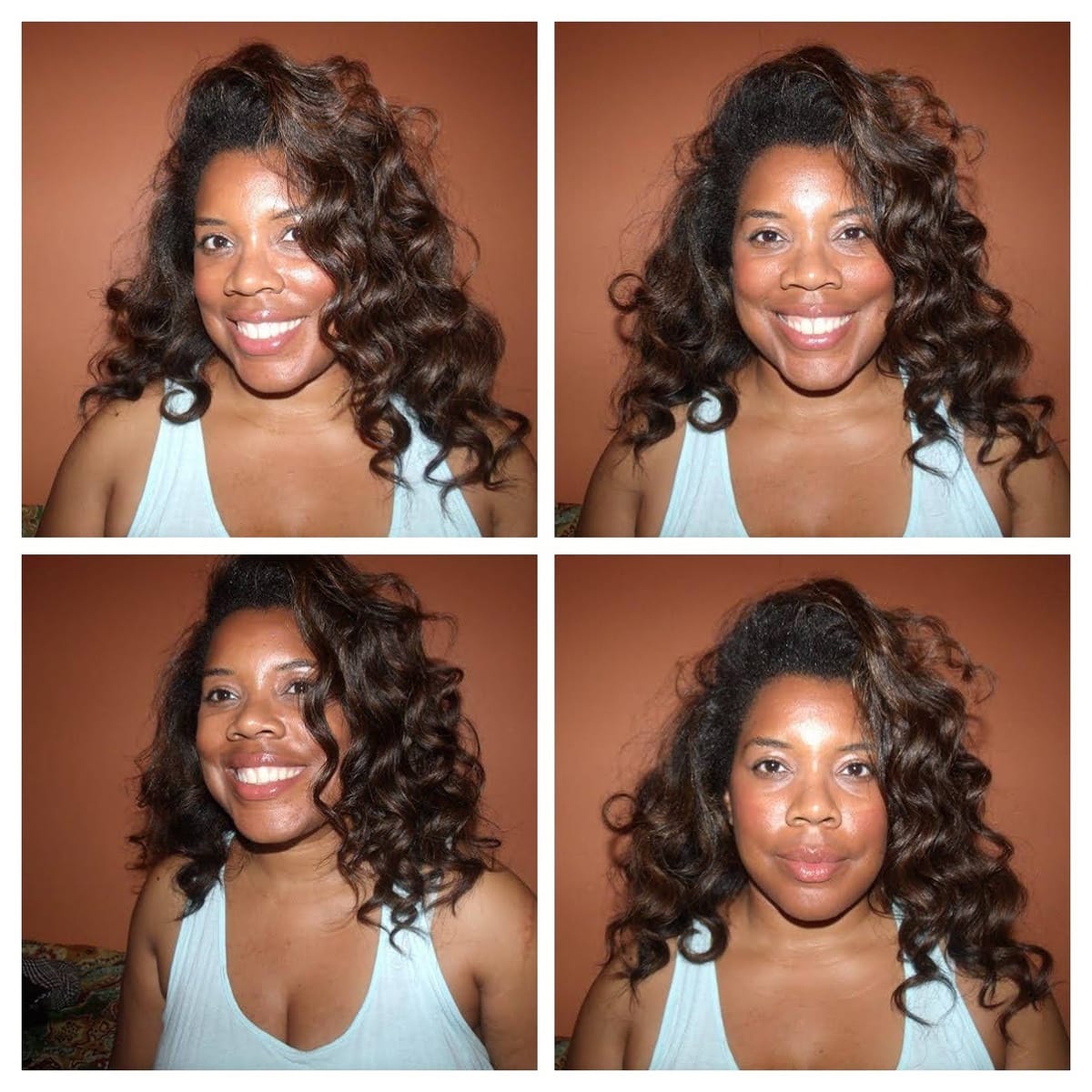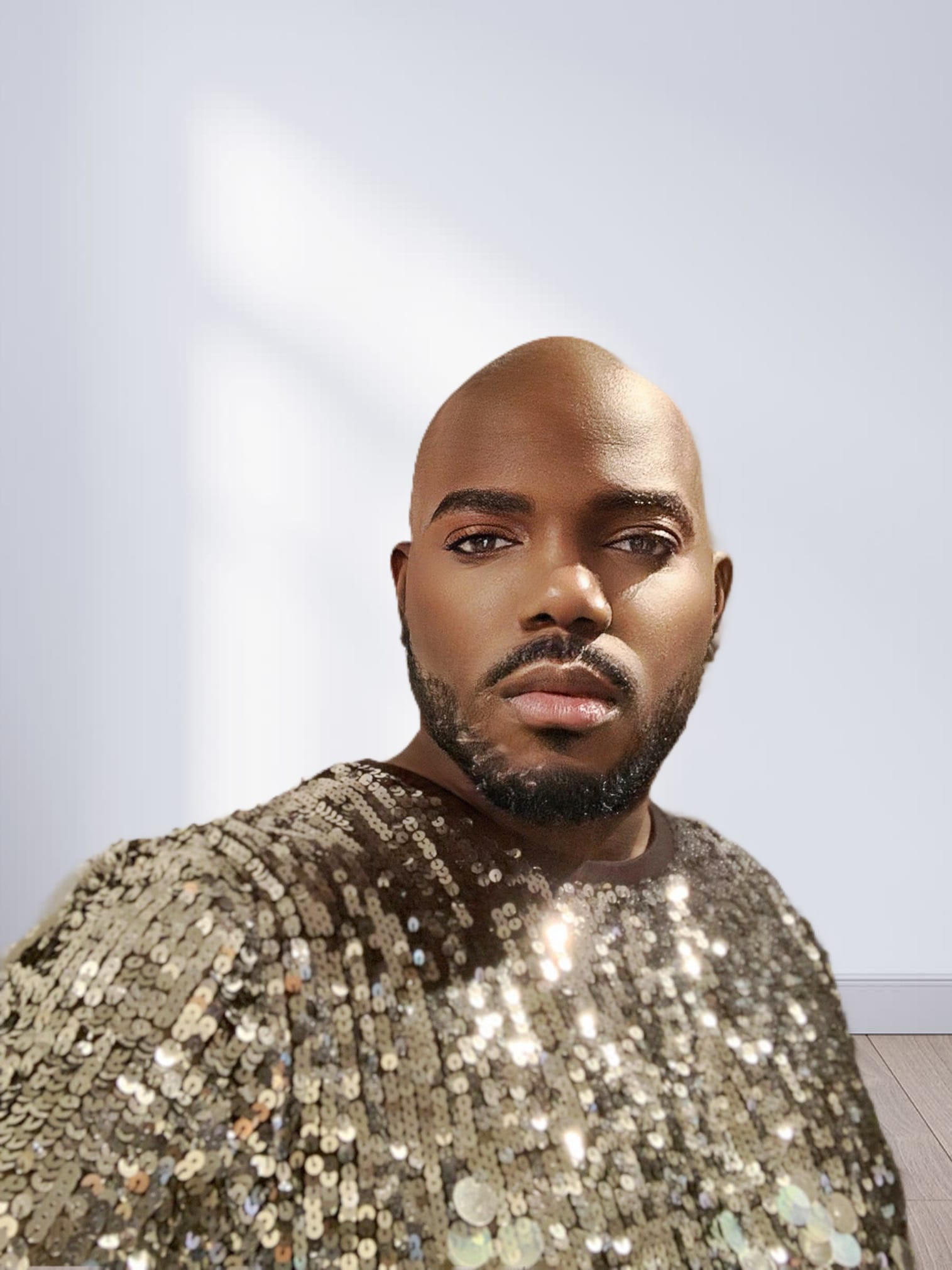On Wegovy, Weight Loss, and When The Hair Isn't "Hair-ing" Anymore
I could have long, healthy hair and be overweight or have limp, weak hair and be thinner — a familiar choice.

For most of my life, I have had a lot of hair. Long, thick, frizzy, curly, bushy hair that I usually have blown dry straight and flat-ironed. And my favorite way to style it after it was straightened was with dramatic, fun spiral curls, as pictured above. When it wasn't in a blowout, it was an overly large, natural twist-out.
It was a lot of fun for a very long time.
Then one day, about two years ago, I started to notice my hair was breaking off more easily. The curl had become looser and flat, and the blowout was getting thinner and thinner. While I still had more hair than I could handle, I was disturbed by the sudden change. I consulted my stylist, Jason Short, best known as Jason Lamar.

Born and raised in New York City, Lamar is an editorial hairstylist, wig designer, and extensions specialist. His work has been seen in various publications, including Vogue, Elle and Harper's Bazaar, and he's done my hair since 2017. Hairstylist Edris Nicholls introduced us after editor and singer/songwriter Maiysha Kai recommended her then-Manhattan-based salon. I came to him, desperate, after six months worth of blowouts from a popular chain salon (and a terrible haircut from ANOTHER chain) destroyed my hair.
For years, we worked on getting my hair from curly and short, to long, thick and voluminous again.

But after growing it out to where it was down the middle of my back again, in 2023, we started to notice that the hair wasn't "hair-ing" like it used to. And even taking breaks from blowouts with protection styles didn't help. At first, I worried it was due to my being older. Often the hair texture or health of the hair can be impacted by menopause, and even though I haven't entered it yet, my ovaries are slowly winding down. But Lamar thought there was a different culprit. One that had radically changed my life: Wegovy.
I've been on some form of the semagultide since winter 2021. In my first two months on the drug I lost 23 lbs. After six months, I lost almost 40 lbs. After a year I was down 70 lbs. As someone who'd been struggling with weight gain since my late 20s, this was a game-changer. Before Wegovy, I gained and lost the same 40 lbs over and over for the past 15 years, until 2020 hit and I gained nearly 60 lbs.
It was my then-primary care physician, Dr. Yadiera Brown, who encouraged me to see Dr. Holly Lofton at NYU Langone's Weight Management Program. Afraid she'd recommend weight loss surgery, Dr. Lofton suggested semiglutide and the rest was history. But was my hair now also history?
"Even before visually seeing that you were losing weight, I noticed changes with your hair," Lamar said. "Your hair started to become more weak and fragile, slightly more dryer than it had ever been. The curl pattern had become looser, and the density of your hair started to become slightly thinner."
While studies do not cite hair loss as a potential side effect, Lamar suspected otherwise, especially knowing the science behind hair growth and health. My case with Wegovy was extraordinary. My doctors marveled at how much weight I lost in such a short time. Most people, on average, lose about 10 or 15 percent of their body weight. I lost 25 percent. I lost so much so quickly because Wegovy erased my appetite almost completely. I was eating less than 800 calories a day. Sometimes, I was lucky to have remembered to eat at all. Meaning, Wegovy was beyond a starvation diet for me. It was anorexia in a needle. And what is a symptom of anorexia? Hair loss.
"I ruled out pre-menopausal hair loss because that tends to happen gradually over a longer period of time. The hair health issues that you were having happened very abruptly," Lamar said. "So I attributed that the issues you were having with your hair were because you weren’t getting the nutrients from your new diet that you had been previously receiving."
Pre-Wegovy, I could eat more than 2,200 calories a day. And I was an emotional eater (eat as a reward when happy, then eat to cheer up when sad, etc.), so the amount could wildly fluctuate. Pre-Wegovy, I only caught colds once a year. Pre-Wegovy, I was at my highest weight ever — 287 lbs.
After Wegovy, I was eating barely anything to the point I would randomly feel faint if I wore heels; lost all interest in food; started getting colds and infections all of the time; and now, was losing my hair.
Nothing comes without a price.
When I first went on my medication for Bipolar disorder in 2007, I knew the medicine would make me fat, but that it would also help me get better mentally. I chose to be fat and sane, rather than skinny and miserable. Wegovy was posing a similar challenge. Take this shot, get thinner, but have jacked up hair, or go off the shot, gain the weight back, and have perfect hair again.
"In my opinion, I feel that women [who] are deciding to go on their health and weight loss journeys, along with women that are premenopausal, that they should consult with a trichologist so that they can take a deeper dive into the health of their hair and scalp, because you can’t have healthy hair without having a healthy scalp."
Lamar recommended that I start taking supplements with an emphasis on hair growth while paying close attention to my iron levels and protein intake. So I started taking a women's multivitamin; added protein to my dietary shakes and smoothies; and took iron tablets to deal with what was then chronic anemia from having fibroids. My hair eventually made a comeback, but didn't fully start to flourish again until I had to go off Wegovy last year for my fibroid removal surgery. I wouldn't start taking Wegovy again with any consistency until a few weeks ago. Now I'm back on the vitamins with the protective styles and watching my protein intake hoping I can avoid ruining my hair again just because I'm resuming my weight loss journey.
As for other women considering weight loss drugs or dealing with hair changes due to menopause, Lamar offers the following advice:
Change it up: "[You're] treating your hair the same as you did when you were younger, using the same products, using the same tools. Your hair is no longer the same as it was when you were in your youth. [Our] hair and body change several times throughout our lives, and our hair care regimens have to change to suit their current state."
Maintenance, Maintenance, Maintenance: "For women of a certain age to maintain the health of their hair, I would start out with making sure that you’re getting regular trims about once every three months, starting with a balance, moisture, protein, and collagen regimen to maintain the strength, elasticity of your hair and its moisture."
Throw away the box: "If you are a woman [who] colors your hair, stop using over-the-counter box color because it can be very drying on the hair. I would suggest going to a cosmetology professional to have your color done because the formulation between over-the-counter color and professional color is two different chemicals.
Watch out for side effects: "Pay attention to medications that you take. Some medications can have side effects that will inhibit the health of hair (such as blood pressure medication)."
Follow Lamar and learn more about his work here.



